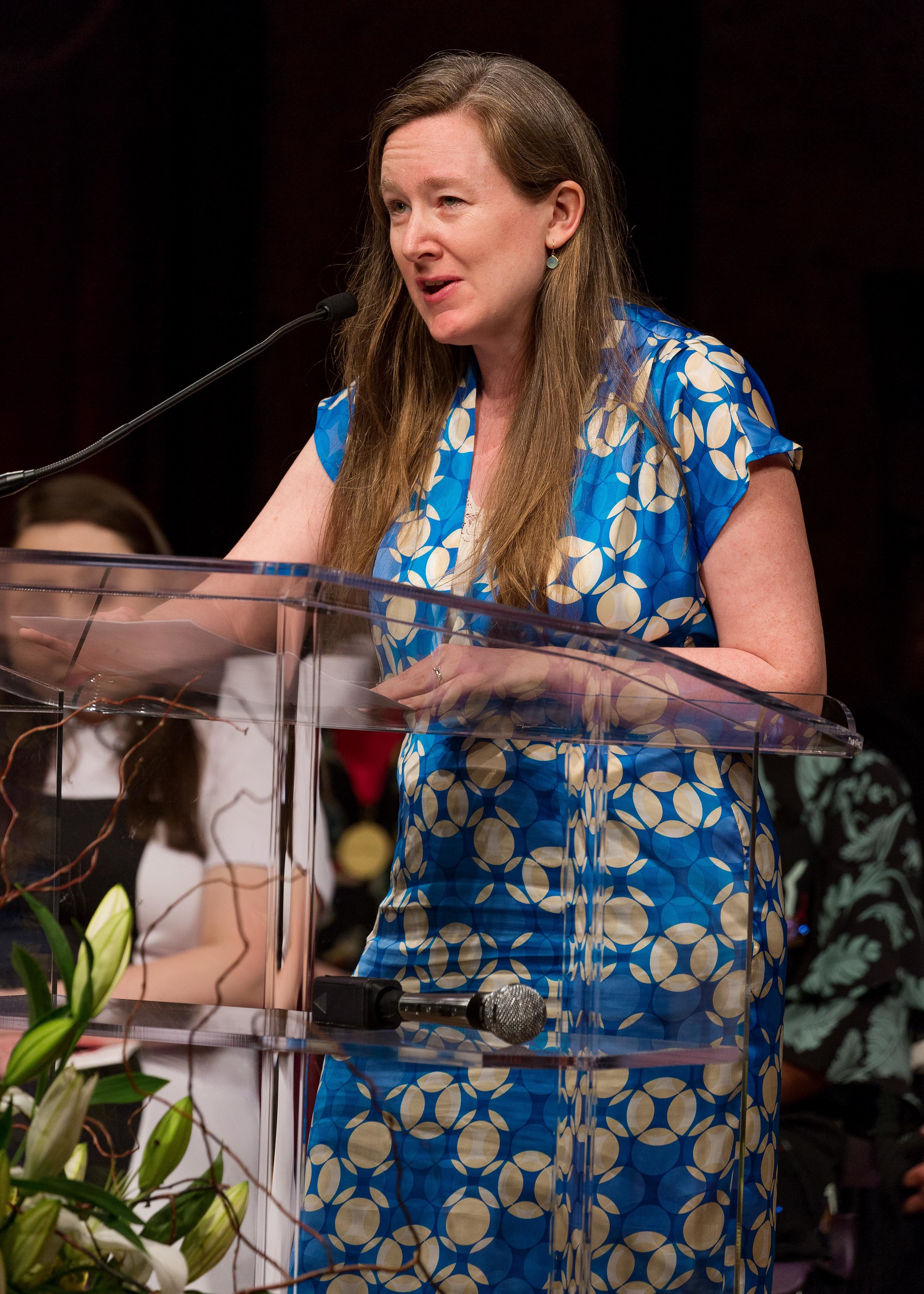Sarah Ruhl at The 2017 Lilly Awards: Lillys and Mothers
Lillys and Mothers
by Sarah Ruhl
On May 22, 2017, Sarah Ruhl spoke about women in theater and theater criticism. The complete text from her speech is published here with Sarah’s permission.
❝
This year was an extraordinary year in terms of the work of women on New York’s stages, and so worth celebrating. The Lilly Awards are my favorite way of celebrating. So many remarkable plays in which incredible women playwrights collaborated with masterful women directors. I had prepared a speech that simmered with a certain amount of rage over a gap I (and many other friends and colleagues) noticed this year between the women’s work on our stages and the somewhat muted critical response—which leads to the feeling that women are still hiding in plain sight. Of course hiding in plain sight is itself a privilege; so many of our most excellent women in the theater don’t feel seen at all. And I think these feelings of quiet rage in our community have been exacerbated by our current political situation, by watching a man interrupt a woman on stage thousands of times and then lie his thuggish way into the Oval Office. So there’s that.
But I woke up this morning thinking about my mother, and the relationship between my mother and the critics. My mother has a phrase she learned from my plainspoken Iowa grandmother: “We’ll make our own fun.” The Lilly’s are a perfect example of how to make our own fun.
My mother’s currently acting in Chicago in a play I wrote for her called For Peter Pan on Her 70th Birthday. I wrote it as a gift for her birthday, a way to fight back the ravages of time with the theater. My mother usually reads all my reviews for me, because I can’t bear to, and because it would prevent me from writing the next play. Now that my mother is actually acting in my play, I implored her not to read the reviews. I was protective of her. She read them all. “It’s all right,” she said, “we’ll make our own fun.”
Fifteen years ago, my mother was yelling at a critic in Evanston, Illinois on my behalf. I was waiting in an idling car for her, wondering in ignorance what was taking her so long. As it turns out, she’d spotted a friend in a cafe. The friend introduced her to his date. My mother recognized the name—it was a reviewer—a woman, incidentally—who had just panned my first professionally produced play. The critic and the man were on a first date after meeting in an internet chat-room. My mother yelled at the critic, “You savaged my daughter! That’s just not the function of criticism.” The critic smiled calmly at my mother, “And I do think that is the function of criticism.” Critics, beware the mother. She might ruin your first date.
On one hand I was mortified that my mother yelled at my critic; it didn’t seem terribly professional. On the other hand, I was deeply proud of her.
I’m incredibly lucky to have a mother who brought me to the theater as a child, who still wants to protect me, who has the phrase “that’s not the function of criticism” in her back pocket and is not afraid to use it. I wonder if our community of women in theater can find ways to mother each other, to occasionally call out the official record of our work and say: “That’s not the function of criticism!” Even as we also find ways to make our own fun.
I think the best kind of criticism makes the play bigger rather than smaller, and expands one’s sense of the possible. Multiple reviewers of many genders, races, sexualities, and, perhaps most importantly, taste in art, might someday review one play and discuss the work in a dialectic. This approach might give the lie to the mask of objectivity and reveal that elusive thumbprint, taste, which can be invisibly gendered. How can both artist and critic contain, as Whitman said, the multitudes? Both of us need imagination and empathy. (Someday maybe they’ll even change the name of that theater review website “www.DidHeLikeIt” to “DidTheyGetIt”?)
I want to thank all of you and celebrate the work of other women in the theater this year—you’ve inspired me, you’ve lit the way. And I have faith—there will come a time when the public humiliation that every artist must endure will be spread out equally over both genders, and will be leveled equally by both genders. And if that kind of equity does not in itself seem something to celebrate, let’s celebrate how we get there—by invoking our mothers, by refusing to shut up, and by making our own fun.
Sarah Ruhl’s Plays include In the Next Room, or the vibrator play, The Clean House, Passion Play, a cycle, Dead Man’s Cell Phone, Melancholy Play; Eurydice; Orlando, Late: a cowboy song, and most recently, Dear Elizabeth, and Stage Kiss. She has been a two-time Pulitzer Prize finalist and a Tony award nominee. Her plays have been produced on Broadway at the Lyceum by Lincoln Center Theater, off-Broadway at Playwrights’ Horizons, Second Stage, and at Lincoln Center’s Mitzi Newhouse Theater. Her plays have been produced regionally all over the country, often with premiers at Yale Repertory theater, Berkeley Repertory theater, the Goodman Theater, and the Piven Theatre Workshop in Chicago. Her plays have also been produced internationally and have been translated into over ten languages. Originally from Chicago, Ms. Ruhl received her MFA from Brown University where she studied with Paula Vogel. She has received the Susan Smith Blackburn award, the Whiting award, the Lily Award, a PEN award for mid-career playwrights, and the MacArthur award. You can read more about her work on www.SarahRuhlplaywright.com. She teaches at the Yale School of Drama, and she lives in Brooklyn with her family.

